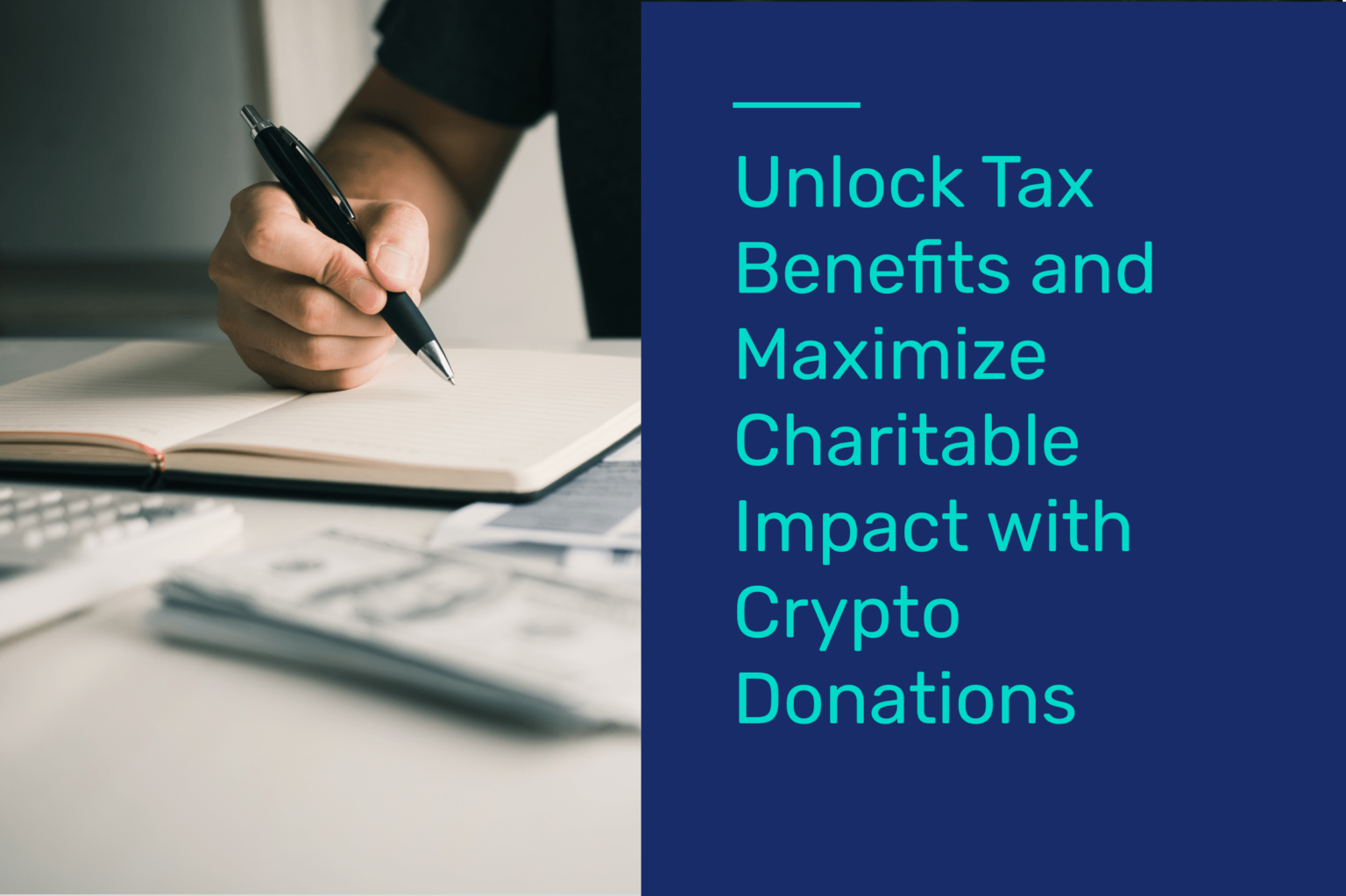Navigating the official guidance and implications of donating digital assets
Many people have the desire to give back to their communities through charitable giving. One way to accomplish this, and as an added bonus reduce your personal income tax bill, is to donate crypto directly to charity.
Donating crypto directly to a qualified charitable organization may help you save money on capital gains tax and could also qualify you for a federal income tax deduction for the donated assets. The tax benefits are particularly clear if your crypto has appreciated in value.
IRS Guidance on Donating Virtual Currencies
The IRS FAQ on Virtual Currency Transactions explains the tax implications of donating virtual currencies to charity. The guidance does not specifically address the tax treatment for donating Non-Fungible Tokens (NFTs), however, most crypto tax professionals agree that the same rules will apply. The guidance is twofold:
- Taxpayers will not recognize income, gain, or loss when donating crypto to a qualifying charitable organization.
- Eligible taxpayers can take a charitable contribution deduction on their tax return for the value of the cryptocurrency (described in more detail below)
In contrast to first selling your crypto and then donating the proceeds from that sale to charity, the tax benefits are clear, especially for appreciated property. Selling appreciated crypto at a gain will result in paying capital gains tax. After-tax, you may have less cash on hand to donate to your charity of choice, so your charitable impact (and the related tax deduction) would be lower.
Calculating your Charitable Deduction
Generally speaking, individuals who itemize deductions on their federal tax returns can claim a tax deduction for a charitable contribution of crypto. The value of your charitable contribution deduction depends on the holding period of the asset.
Long-Term Assets
If you have held the donated asset for more than one year, your deduction will be equal to the fair market value of the virtual currency at the time of the donation. Assets that have appreciated in value would have the greatest tax benefit in this case, allowing you to both avoid capital gain tax on the appreciation AND get a deduction for the full fair market value of the asset.
Short-Term Assets
If you have held the donated asset for one year or less, your deduction is the lesser of:
- Your basis in the virtual currency OR
- The virtual currency’s fair market value at the time of the contribution
Due to these rules, the tax benefits of donating short-term assets may not be as straightforward as long-term asset donations. For simplicity’s sake, most tax advisers will recommend donating assets in the order of preference below:
- Long-term appreciated assets
- Short-term appreciated assets
- Short-term assets in a loss position
If a major goal of your charitable giving is to minimize your tax bill, consult with your tax advisor to be sure you understand the best giving strategy for your specific situation.
Supporting your Charitable Donation
The higher the value of your crypto donation, the more robust your documentation needs to be to substantiate that contribution as a deduction on your tax return. The donation of digital assets is subject to the same reporting rules that govern the donation of other noncash property, and may require you to complete IRS Form 8283 and attach it to your tax return. You should consult with your tax advisor to ensure you have the necessary documentation for your specific situation. Having the correct documentation is important. Without it, the IRS may deny the deduction in full.
Crypto valued at $250 or less
If the value of your donation is $250 or less, you can claim the charitable deduction on your tax return without attaching any further support/documentation. You should save any documentation of the contribution in your personal tax records.
Crypto valued over $250
Where the value of a donation is $250 or more, you must obtain a contemporaneous-written acknowledgment from the donee. This acknowledgment must be obtained by the time the tax return is filed, or no later than the due date of the tax return if the tax return is not filed on time.
It needs to include a few specific statements from the donee:
- A description of the donated property
- A statement as to whether any goods or services were provided by the donee to the donor in exchange for the donation
- If any goods or services were provided by the donee, an estimate as to the value of those goods or services.
Crypto valued between $500 and $5,000
Where the value of the donation is greater than $500 but less than $5,000, you are required to complete Form 8283, Section A, to support your contribution. Section A requires specific information about the donee, the donated property, and the date of the donation. As long as the value of your contribution is less than $5,000, you should not need to complete any other sections of the Form 8283 to support your donation.
Crypto valued at $5,000 or more
If you made a donation valued at more than $5,000, you will be required to complete Form 8283, Section B, and obtain a qualified appraisal of the donated crypto. The qualified appraisal needs to be completed by a qualified appraiser and the qualified appraiser will need to complete Section B, Part IV “Declaration of Appraiser” on Form 8283. The donee organization also needs to sign the “Donee Acknowledgement” on Form 8283.
If the donation is less than $500,000, the appraisal must be maintained as part of your tax records and not provided to the IRS unless they ask for it. If the donation is greater than $500,000, the appraisal needs to be submitted with the tax return.
Until recently, many individuals were unsure whether an appraisal of crypto needed to be obtained even when the value of the donation exceeded $5,000. The tax code provides an exception to the appraisal requirement for a very specific list of items that are considered “readily-valued” property. Crypto is not on this list even though many feel that some crypto is readily valued, such as bitcoin or ether. The IRS recently confirmed its view that an appraisal is required under the tax code and that an individual cannot rely on the trading value of crypto on an exchange as an appraisal.
Under the tax code, a qualified appraisal is an appraisal that is prepared in accordance with generally-accepted appraisal standards for the subject property. The appraisal also must be prepared no earlier than 60 days prior to the donation and no later than the due date of the tax return.
Because of the novelty of digital assets, it is not yet clear what those standards might be, but the IRS will likely look to accepted standards for appraising other types of intangible personal property.
More importantly, the tax code requires that the appraisal be completed by a qualified appraiser. This is not just someone who is familiar with crypto prices. A qualified appraisal must:
- Hold a designation from a professional appraisal organization or meet minimum requirements set for by the IRS indicating that the appraiser is qualified to value the subject property, and
- Regularly hold themselves out to the public as an appraiser
Regardless, even if an individual meets the above requirements, they cannot be considered a qualified appraiser if:
- They are the donor of the property
- They were a party to the transaction through which the donor acquired the property (which may include an exchange where the donated property was purchased)
- They are the donee receiving the property
- They are an employee of the disqualified persons, above
- They are a non-employee of the disqualified persons, above, who are regularly used by the persons above to do appraisals
For many fungible digital assets, obtaining a qualified appraisal reflecting the fair market value of a charitable donation should be relatively straightforward. It is just a step that needs to be completed and an expense to incur. Recognizing these hurdles, a few policymakers in Congress have proposed changing the tax code to allow some digital assets to be exempted from the appraisal requirement but no legislation has been passed as of yet.
For those donating crypto that need to obtain an appraisal, the selection of an appraiser is something to think about because of the limitations on who can be a qualified appraiser. It may make sense to rely on the exchange where the crypto was held prior to the donation or an appraiser working for the charitable organization but those individuals may not be considered qualified under the tax code. If the donation is of significant value, it is always prudent to work with a tax professional to ensure that the substantiation rules are followed.
Conclusion
Donating crypto directly to a qualified charitable organization can be a tax-efficient way to give back to your community and maximize your charitable impact. By donating appreciated assets that you have held for more than one year, you can avoid paying capital gains tax and claim a charitable contribution deduction on your tax return for the full fair market value of the asset. However, documenting your contribution accurately is crucial to avoid any issues with the IRS. If you are considering donating crypto to charity, consult with your tax advisor to determine the best giving strategy for your specific situation, and ensure that you have all the necessary documentation to support your contribution.
How Taxbit Can Help
At Taxbit, we are building industry-leading solutions for digital asset compliance. Our technology is trusted by some of the world’s largest regulatory agencies, accounting firms, and Fortune 500 companies with features such as:
- Scalability to handle tens of millions of transactions
- A controlled environment to support robust control frameworks such as ISO 27001 or SOC 1 & 2
- Audit support that is built with your auditors in mind
- Leading expertise from our team of IRS, AICPA, and Big-4 alumni
.png)


